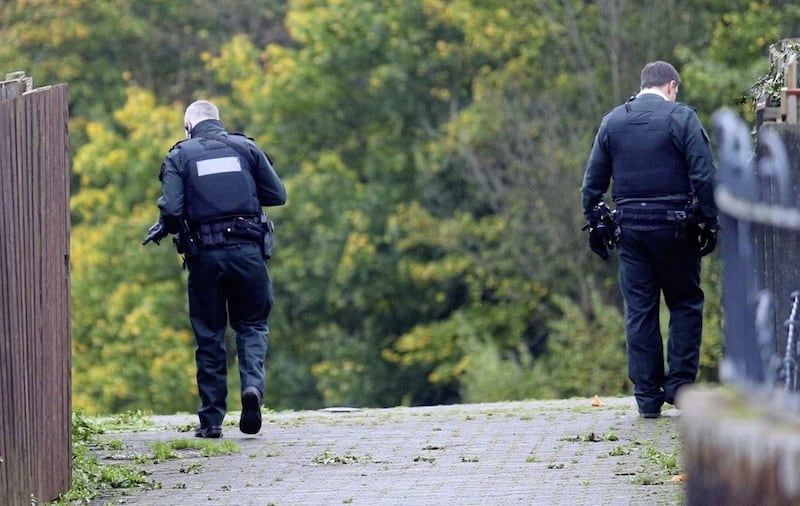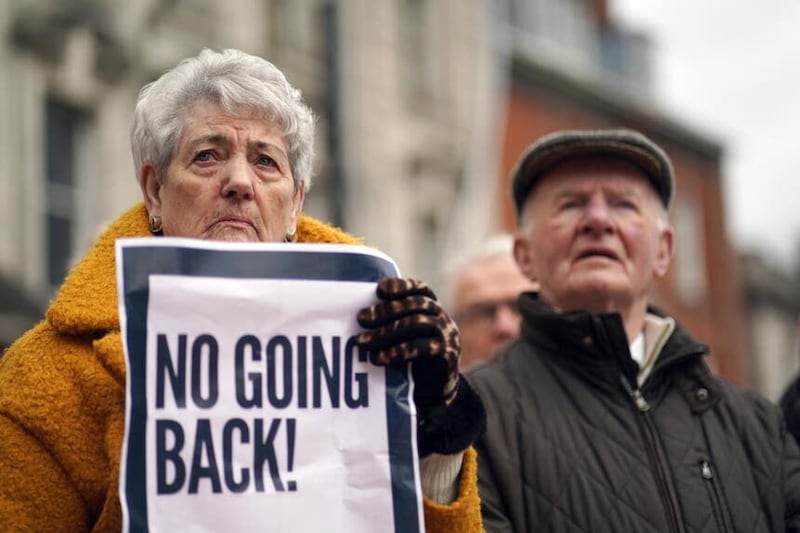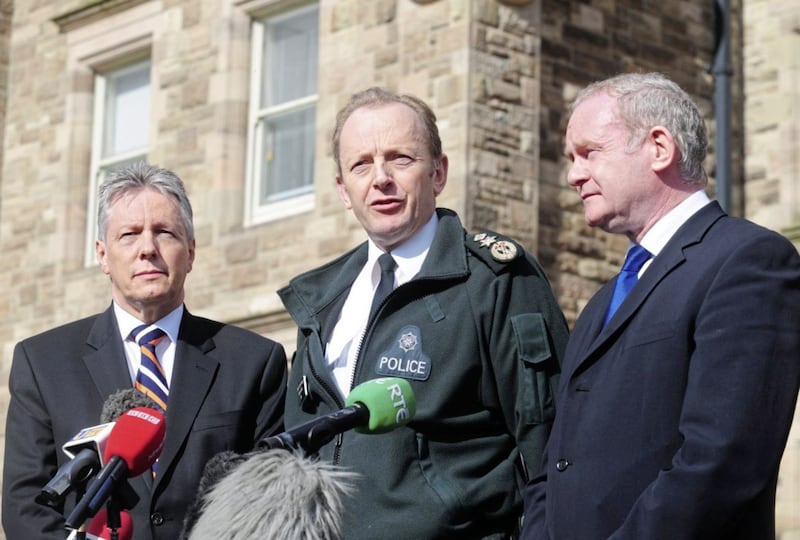What do dissident republicans want?
Dissident republican groups reject the peace process in Northern Ireland and the political institutions set up after the signing of the Good Friday Agreement. Their aim is to destabilise Northern Ireland through the use of physical force violence, as well as seeking to cause disruption and economic damage to the state. Since 1998 they have killed two policemen, two British army soldiers, two prison officers and at least five civilians. They have specifically targeted Catholic police officers in an attempt to intimidate members of the nationalist community from joining the PSNI. They have also carried out multiple punishment attacks on civilians.
In August 2023 a data breach by the PSNI saw the details of 10,000 police officers and support staff posted online. The then chief constable, Simon Byrne, said the information was in the hands of dissident republicans. A document, which is thought to have been obtained during the data breach, was later posted on a wall in west Belfast.
How many dissident republican groups are there?
There are four main dissident republican groups: the Continuity IRA (CIRA), Óglaigh na hÉireann (ONH) – which subsequently split into two factions ONH and Irish Republican Brotherhood (IRB), the new IRA and Arm na Phoblacht (ANP). All oppose the peace process and regard violence as a legitimate means of achieving a united Ireland. None have any political representation in either the Northern Ireland Assembly or the Irish parliament (Dail).
The INLA is not technically regarded as a dissident group because, while it is involved in serious crime such as drug dealing and extortion, it does not actively target security force personnel.
Do dissident republicans have elected political representatives?
Dissident groups have no officially elected politicians although there are a handful of independent elected councillors across Northern Ireland who, while not advocating violence, would also refuse to condemn the actions of various dissident groups. Not every Irish republican who opposes the peace process or Good Friday Agreement/Belfast Agreement supports the use of violence.
Do dissident republicans have a sizeable arsenal?
Dissident groups have not been able to repeat the PIRA’s success in smuggling large numbers of weapons into Ireland.
They have repeatedly attempted to smuggle weapons from other parts of the world, particularly eastern Europe. However, the British security services have managed to thwart the majority of these attempted smuggling operations with a number of dissident leaders being jailed for lengthy prison sentences. In August 2020 the New IRA was dealt a significant blow when 10 alleged leading members were secretly filmed at a series of meeting discussing attempts to procure weapons for an increase in violence. Security experts believe that constant splits and tensions within dissident groups have seriously hampered their ability to build any effective, organized campaign of violence.
Dissident republican group Arm na Poblachta (ANP)

Republican group Arm na Poblachta (ANP) is understood to include former members of other paramilitary organisations including the Continuity IRA and Óglaigh na hÉireann.
It emerged in 2017 and has pockets of support in Derry, Tyrone, Armagh and Belfast.
In November 2017 it claimed responsibility for leaving an EFP (Explosively Formed Projectile) in Poleglass on the outskirts of west Belfast.
The armour-piercing horizontal device was discovered after a three-day security operation carried out in the area.
It was also linked by the PSNI to the killing of Raymond Johnston (28) in the Poleglass area of west Belfast in February 2018.
In May that year police linked an explosives find in the Benburb area of Co Tyrone to the group, while a paramilitary-style attack in west Belfast was also attributed to it.
In 2021 it claimed to have left a roadside device in the ‘Ballyarnett Road’ area of Derry.
In 2022 it also claimed that it left an IED outside Dungiven, Co Derry, and another near Derry city.
Widespread disruption was caused in November 2022 when a hijacked delivery driver was forced to drive a bomb to a PSNI station in the Waterside area of Derry.
Who are the dissident republican group the New IRA?
The New IRA are believed to be the largest and most active of the dissident republican terrorist groups in Northern Ireland. At the time of the major PSNI data breach in August 2023, then PSNI Chief Constable Simon Byrne said the paramilitary group claimed to be in possession of the details of 10,000 staff.
The New IRA's violent campaign

The New IRA claimed responsibility for the shooting of Detective Chief Inspector John Caldwell in February 2023.
In March of the same year MI5 increased the terror threat level in Northern Ireland from “substantial” to “severe”, meaning an attack is highly likely.
The New IRA has been linked to a number of murders, including those of journalist and author Lyra McKee in April 2019, PSNI Constable Ronan Kerr in 2011, and prison officers David Black in 2012 and Adrian Ismay in 2016.
A month before the killing of Ms McKee, the New IRA claimed responsibility for sending small explosive devices in the post to two airports and a train station in London and to the University of Glasgow.
In January 2019 police blamed the New IRA after a bomb placed in a van exploded outside the court building in Derry.
In June 2019 the New IRA claimed responsibility for the failed attempted murder of a police officer after an unexploded bomb was found under the officer’s car parked at Shandon Park Golf Club in Belfast.
When was the New IRA formed?
The New IRA is believed to have been formed between 2011 and 2012 following the merger of a number of smaller groups, including the Real IRA, the group behind the 1998 Omagh bomb.
The group is strongest in Derry and Strabane, with a presence in Belfast, and other pockets in Co Tyrone and Lurgan in Co Armagh.
In August 2020 the alleged leadership of the New IRA suffered a major blow with a series of arrests prompted by an MI5 surveillance operation.
Less than a year before, in September 2019, a bomb in an “advanced state of readiness” was found in the Creggan area of Derry.
Police said the device, attributed to the New IRA, was designed to kill police officers.
Dissident republican groups and the threat level
Dissident republican terrorist activity had been at a lower level in Northern Ireland in recent years and security services have secured a number of successes disrupting the activities of terror groups.
In March 2023 the level of terrorism threat from dissident republicans was raised from severe to substantial following the attack on DCI John Caldwell.
The level is subject to continuous review and judgments are based on a wide range of information.
In March 2022 the threat level had been lowered from severe for the first time in 12 years.
Timeline of dissident republican violent activity
1996
January: CIRA carries out its first major attack exploding a car bomb outside a Co Fermanagh hotel, injuring 17 people.
1997
November: Real IRA launches its campaign of violence and in the following year carries out a series of mortar and car bomb attacks across Northern Ireland.
1998
August: A 500lb car bomb kills 29 people and two unborn children in Omagh, Co Tyrone. The Real IRA admits responsibility for the atrocity and as a result of public outrage calls a ceasefire which lasted until January 2000.
2000
September: Real IRA fire a rocket at MI6 headquarters in London.
2002
August: Civilian army base worker David Caldwell is killed by a booby trap planted at a Territorial army base in Derry.
2003
August: RIRA murder former republican prisoner Danny McGurk at his west Belfast home.
2009
March: The Real IRA shoot dead British army soldiers Patrick Azimkhar and Mark Quinsey as they collected pizzas outside Massereene Army barracks in County Antrim.
Within 48 hours PSNI officer Stephen Carroll is shot dead in Craigavon, County Armagh, becoming the first police officer to be murdered in Northern Ireland since 1998.
In the following months dissidents target the homes of Sinn Féin politicians, including Gerry Adams.
October: The partner of a PSNI officer is injured when a bomb explodes under her car in east Belfast.

2010
January: Catholic police officer Peadar Heffron is seriously injured in a dissident republican booby trap car bombing at Randalstown, County Antrim.
February: The Real IRA killd one of its own members, Kieran Doherty, who it alleges was an informer.
April: Dissidents explode a car bomb attack outside Palace Barracks, Holywood, on the day policing and justice powers are transferred to Northern Ireland.
December: Three police officers are injured when a hand grenade is thrown at them in west Belfast.
2011
April: Catholic PSNI officer Ronan Kerr is killed after a bomb explodes under his car outside his home in Omagh, Co Tyrone.
2012
February: Republican Action Against Drugs (RAAD) murder Derry man Andrew Allen who it alleged was involved in drugs. Later that summer RAAD and the Real IRA formed a new grouping known as the IRA.
November: The new grouping (IRA) shoot dead prison officer David Black on his way to work in Co Armagh.
2013
December: Two police cars are struck 10 times by gunfire while travelling along the Crumlin Road in north Belfast.
2014
March: Dissidents fire a mortar bomb at a police patrol in west Belfast.
2015
December: Two significant dissident arms finds discovered in Republic of Ireland.
2016
March: Prison officer Adrian Ismay died from injuries sustained from a dissident bomb attack.
April: Catholic taxi driver Michael McGibbon dies after a dissident punishment shooting in north Belfast.
October: West Belfast man Joe Reilly shot dead by dissidents in his west Belfast home for alleged drug dealing.
2017
January: A PSNI officer is injured in a dissident gun attack in north Belfast.
February: British army soldier Ciaran Maxwell is jailed for 18 years for possessing and making dissident bombs.
2018
January: Óglaigh na hÉireann (ONH) declared a ceasefire stating: "at this time the environment is not conducive to armed conflict".
February: Dissidents are blamed for the murder of west Belfast man Raymond Johnston.
2019
April: Writer and journalist Lyra McKee (29) was shot dead while observing rioting in the Creggan area of Derry
2020
August: Ten people alleged to be senior members of the New IRA ae arrested and charged with serious terror offences following an undercover MI5 surveillance operation.
2023
February: Dissidents shot and seriously injured PSNI detective John Caldwell in Omagh, Co Tyrone.
Read more: DCI John Caldwell shooting reminder of other attacks on police officers
March: MI5 raised the dissident threat level from substantial to severe, meaning the risk of attack was "highly likely". The decision, based on an MI5 intelligence assessment, reversed a downgrade to the threat level in 2022, the first such downgrade in 12 years.
August: Dissident groups claimed to have possession of the personal details of 10,000 PSNI officers and support staff, which was inadvertently publicly disclosed as part of a Freedom of Information (FoI) request by the PSNI.








